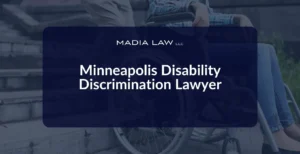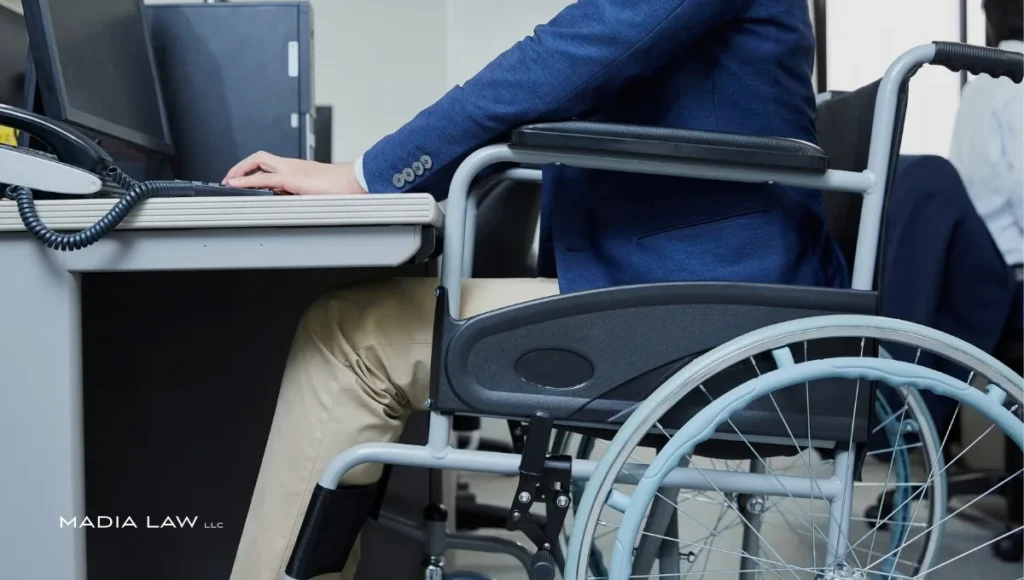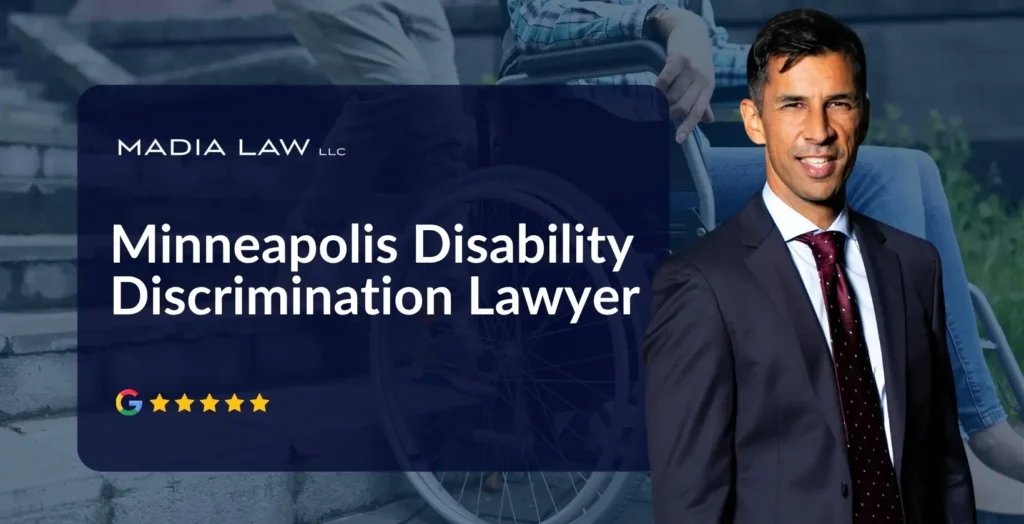
Disability discrimination is illegal under both the Americans with Disabilities Act (ADA) and the Minnesota Human Rights Act (MHRA). In Minneapolis, workers often experience violations such as wrongful termination after disclosing a condition, denial of reasonable accommodations despite documentation, reduced work hours based on medical assumptions, or unfair discipline triggered by a health-related absence.
Minnesota is an at-will employment state, but that does not allow employers to violate anti-discrimination laws. If your employer mistreated you because of a physical or mental health condition, their actions likely violate federal and state legal protections.
Madia Law LLC represents employees in Minneapolis and across all of Minnesota who have faced disability discrimination at work. If you were fired, demoted, retaliated against, or denied accommodations after disclosing a condition, our Minneapolis disability discrimination lawyer will take legal action to enforce your rights and pursue compensation under the ADA and MHRA.
Why You Need a Minneapolis Disability Discrimination Lawyer
You need a Minneapolis disability discrimination lawyer because these kinds of cases involve complex legal rules and common employer retaliation tactics. After you report discrimination, employers are likely to go on the attack, responding with reduced hours, sudden write-ups, or termination, while denying any legal responsibility.
These actions frequently violate your protections under the ADA and MHRA. A lawyer helps you take legal action by:
- Gathering documentation such as emails, accommodation requests, and personnel records.
- Applying ADA and MHRA legal standards to prove your employer failed in their obligations.
- Establishing the three required elements for a Minnesota disability discrimination claim:
- You have a qualifying disability.
- You are still capable of performing your essential job duties.
- Your Minnesota employer denied accommodations or treated you unfairly because of your condition.
Legal support increases your chances of success by turning personal records into admissible evidence and holding employers accountable under state and federal law.
For a legal consultation with a disability discrimination lawyer serving Minneapolis, call 612-349-2729
How Our Lawyers Help You with Disability Discrimination Cases
Madia Law LLC’s Minneapolis employment attorneys help victims in the Twin Cities metro and surrounding suburbs who are facing disability discrimination by building strong legal cases and acting quickly to protect their rights. Our team applies ADA and MHRA protections to stop retaliation, challenge wrongful termination, and secure accommodations through negotiation or litigation.
We take fast, strategic steps to investigate your claim, preserve evidence, and hold your employer accountable under Minnesota state and federal law.
Legal Guidance Rooted in Experience
Our legal team brings over 10 years of focused experience in ADA and MHRA workplace discrimination cases. We’ve represented hundreds of Minnesota employees who were terminated, retaliated against, or denied accommodations after disclosing a condition.
Unlike the dozens of general practice firms in the Gopher State, Madia Law LLC focuses exclusively on Minnesota employment law, using in-depth knowledge of federal and state regulations to enforce your rights through trial or settlement.
Building a Strong Case
We build strong disability discrimination cases with clear, admissible evidence. This includes:
- Internal documents like emails, HR complaints, and policy manuals.
- Medical records and accommodation requests.
- Testimony from coworkers, supervisors, or medical professionals.
Clear, Honest Communication & Real Support
Madia Law LLC combines legal transparency with personal support to guide Minnesotans through the particulars of their cases. We:
- Keep you informed with regular updates and plain-language explanations.
- Respond quickly to your questions about legal options, deadlines, or next steps.
- Stay available to help you understand your rights and handle the emotional stress of workplace discrimination.
- Treat every client with respect, clarity, and compassion from consultation to resolution.
Minneapolis Disability Discrimination Lawyer Near Me 612-349-2729
Do You Have a Case? How Lawyers Prove Disability Discrimination at Work
To prove a disability discrimination case, a lawyer must show that your employer took negative action because of your disability, not because of another legitimate reason. Both the Americans with Disabilities Act (ADA) and the Minnesota Human Rights Act (MHRA) require employers to consider reasonable accommodations unless doing so creates an undue hardship.
Attorneys evaluate five key legal elements to determine if you have a case:
- You have a legally recognized disability: Your condition meets the legal definition under the ADA or MHRA.
- You can perform essential job functions: You are able to execute your core workplace duties with or without reasonable accommodations.
- You requested an accommodation: You formally asked for a change or support based on your condition.
- Your employer denied or ignored the request: The employer failed to respond appropriately or dismissed your request outright.
- You faced adverse action connected to your condition: Termination, demotion, or discipline occurred after disclosure or a filed request, with evidence such as timing, internal emails, or witness testimony linking the action to your disability.
When these elements are supported by facts and documents, you likely have a strong claim under both Minnesota and federal law.
Click to contact our Employment Lawyers in Minneapolis for Workplace Legal Issues today
Can My Employer Fire Me for Filing a Disability Discrimination Claim?
No, it is illegal for your employer to fire you for filing a disability discrimination claim. Both the Americans with Disabilities Act (ADA) and the Minnesota Human Rights Act (MHRA) strictly prohibit retaliation against employees who assert their rights under the law.
Retaliation includes wrongful termination, demotion, suspension, or disciplinary actions taken after you report discrimination or request accommodations. These are considered separate legal violations under ADA and MHRA enforcement standards.
If your employer punished you after filing a claim, we can help you file a retaliation case to recover lost wages, emotional damages, and other compensation under Minnesota and federal law.
Complete a Case Evaluation form now
What Should I Do if I’ve Been a Victim of Disability Discrimination?
If you have experienced disability discrimination at work, act immediately to protect your legal rights under the ADA and the Minnesota Human Rights Act. Swift and decisive action helps preserve key evidence and strengthens your case if you choose to file a claim.
Follow these five steps right away:
1. Document What Happened
Write down dates, names, conversations, emails, and incidents in detail. Save any supporting records, including job descriptions, write-ups, or denied accommodation requests.
2. Request Accommodations in Writing
Send your request by email or letter to create written proof that your employer was notified of your condition and your legal rights under the ADA or MHRA.
3. File an Internal Complaint
Report the discrimination to HR or upper management. Keep a copy of your complaint and any written response from your employer.
4. Request Your Personnel File and Final Pay
Under Minnesota law, you are entitled to access your personnel file. Submit a written request, and ask for any final wages if your employment has ended.
5. Contact an Employment Lawyer
Legal deadlines can come at you fast. A skilled employment lawyer in Minneapolis will help you file your claim, gather evidence, and take immediate legal action to enforce your rights.
Understanding Disability and Discrimination in Employment Law
Disability discrimination laws protect employees from unfair treatment based on their physical or mental health conditions. Understanding what qualifies as a disability, how discrimination is defined, and why essential job duties matter can help you recognize when your rights have been violated and whether you may have a valid legal claim.
What is Disability Discrimination in the Workplace?
Disability discrimination occurs when your employer takes negative action against you because of a physical or mental condition. Common examples include:
- Firing or demoting you after disclosing a medical condition.
- Denying approved medical leave or accommodations.
- Ignoring a doctor’s restrictions or medical documentation.
- Excluding you from training, promotions, or meetings.
The ADA and MHRA protect individuals with current, past, or perceived disabilities, even if the condition is well-managed or no longer active.
What Qualifies as a Disability Under ADA and MHRA?
A qualifying disability is any physical or mental impairment that substantially limits a major life activity. You are protected under federal or Minnesota law if you:
- Have a current medical or psychological condition.
- Have a documented history of such a condition.
- Are perceived by your employer as having a disability, even if you do not.
Common examples include:
- Chronic illnesses (e.g., diabetes, epilepsy)
- Mental health conditions (e.g., PTSD, anxiety, depression)
- Sensory impairments (e.g., hearing or vision loss)
- Neurological conditions (e.g., ADHD, autism, brain injury)
What Are Essential Job Functions?
Essential job functions are the core duties of your position, not temporary, optional, or minor tasks. These are central when determining your right to reasonable accommodations.
Courts and agencies consider three factors to identify essential functions:
- Your official written job description.
- How much time do you spend on each task.
- How others in similar roles perform the same job.
If you can perform your essential duties with or without accommodations, your employer cannot legally discriminate against you.
Your Rights as an Employee and Employer Obligations
If you have a physical or mental disability, the law protects your right to fair treatment in the workplace. It also requires your employer to follow specific legal duties. These protections come from the Americans with Disabilities Act (ADA) and the Minnesota Human Rights Act (MHRA).
As an employee, you have the right to:
- Request reasonable accommodations that support your ability to work.
- Assert your legal protections without facing retaliation.
- Keep your medical information private and secure.
As a Minneapolis employer, state law requires a company to:
- Take part in an interactive process and discuss possible accommodations in good faith.
- Provide reasonable accommodations unless they create significant hardship.
- Maintain confidentiality about your medical condition and related documentation.
- Avoid any form of retaliation, including termination, demotion, or disciplinary actions, after you speak up.
How Much is My Disability Discrimination Case Worth in Minneapolis?
The value of a disability discrimination case in Minneapolis depends on the types of damages available under state and federal law. Damages are based on your financial loss, emotional distress, and the severity of the employer’s actions.
There are five common types of compensation:
- Lost wages: This includes back pay and front pay if you lost your job and cannot return to your position.
- Emotional distress: Compensation may cover stress, anxiety, or mental health harm caused by discrimination or retaliation.
- Punitive damages: These may apply in cases involving serious or willful employer misconduct.
- Attorney’s fees and costs: If your case succeeds, the employer may be required to cover your legal expenses.
- Reinstatement: In some cases, you may have the legal right to return to your previous role.
Under the Minnesota Human Rights Act, you may recover up to three times your actual losses. Federal law, including the ADA, may provide additional compensation depending on the facts of your case.
What is the Statute of Limitations for Filing a Claim in Minnesota?
You have 300 days from the date of the discriminatory act to file a disability discrimination claim in Minnesota. This deadline applies when filing with either the Equal Employment Opportunity Commission (EEOC) or the Minnesota Department of Human Rights (MDHR).
If your case moves to court, other deadlines may apply depending on whether the claim is brought under state or federal law. Missing the filing window can lead to automatic dismissal, even if your employer clearly violated the law.
In rare cases, the deadline may be extended if:
- You were misled about your legal rights.
- You were medically or legally incapacitated.
- You did not discover the discrimination until after the fact.
Why Choose Madia Law LLC for Your Disability Discrimination Case?
Madia Law LLC focuses exclusively on employment law and represents Minnesota workers in ADA and MHRA disability discrimination cases. We handle claims involving termination, retaliation, and denied accommodations.
Our legal team brings focused experience and proven results to serve the citizens of Minnesota. The following sections explain what sets us apart.
Proven Experience in Employment Law
We have over 10 years of experience representing Minnesota employees in disability discrimination cases. We focus exclusively on employment law and regularly handle claims involving wrongful termination, retaliation, and denied accommodations under the ADA and MHRA. This depth of experience gives clients a strategic advantage in litigation and settlement.
Real Case Outcomes
We are proud to have helped clients recover significant compensation in ADA and MHRA cases. One recent result involved a long-term employee wrongfully fired after making a medical disclosure.
Case Example: $400,000 Settlement
We represented Jill, a 20-year employee at a Fortune 100 company. After a back injury, her doctor limited her lifting to 40 pounds. Her role did not involve heavy lifting, and she continued to meet all job expectations. Despite this, her Minnesota employer fired her, claiming she could not perform essential functions and refusing to discuss accommodations.
We challenged the termination, defeated the employer’s motion to dismiss, and secured a $400,000 settlement.
Note: Case outcomes vary based on facts, evidence, and applicable legal standards.
Client Testimonials and Reviews
Clients consistently describe Madia Law as responsive, clear, and committed. Our reviews proudly highlight our communication, legal knowledge, and strong support during complex ADA and MHRA cases. Many clients report feeling heard, respected, and empowered throughout the process.
“Highly recommend Madia Law LLC. From the first phone call throughout my entire case, the team at Madia Law were competent and compassionate! In a rough time, they made not only the process easy, but always put me at ease as well. Claudia, Sara, Ashley, and Ashwin were all amazing! Any interaction with any of the staff was always friendly, professional, and respectful. The whole team was 100% kind and caring. Ashwin was always responsive, easy to communicate with, and did a fantastic job handling my case. I was very satisfied with my outcome. I would return to Madia Law if I needed anything again, as they always went above and beyond. If you choose Madia Law, you will not be disappointed!”
— Rebecca Paulon
Personalized Legal Strategy
Every case at Madia Law is approached with a strategy built around your specific goals and evidence. We carefully evaluate the facts of your individual case, identify the best legal path, and pursue resolution through early settlement, mediation, or trial. Our legal plans are specifically tailored, not template-based, to maximize the outcome in ADA and MHRA claims.
Frequently Asked Questions About Disability Discrimination Lawsuits
What conditions are not considered disability?
Temporary conditions like a sprained ankle, mild stress, or the common cold usually do not legally qualify as a disability. The ADA and MHRA focus on impairments that substantially limit one or more major life activities, either long-term or permanently.
How much can you sue for disability?
It depends on the case. Damages may include back pay, emotional distress, attorney’s fees, and possibly punitive or treble damages. Each case is unique, so speaking with an employment lawyer is the best way to understand your potential recovery.
What are the common examples of disability discrimination?
The common examples of disability discrimination are:
- Being fired after requesting medical leave.
- Denial of a simple accommodation like a standing desk or remote work.
- Being excluded from meetings or promotions after disclosing a condition.
- Sudden demotion after sharing a doctor’s note.
Talk to a Minneapolis Discrimination Lawyer Today
If your employer treated you unfairly because of a disability, you may have a valid legal claim under the ADA or the Minnesota Human Rights Act. Madia Law LLC helps employees in the Twin Cities and throughout Minnesota take action and protect their rights in workplace discrimination cases.
Call (612) 349-2729 or fill out our contact form to schedule a confidential consultation. A member of our legal team will review your information to determine if your case qualifies under state or federal law.
If your claim has merit and potential to meet the legal standards, we will schedule a one-on-one strategy session with an attorney. Acting quickly helps preserve critical evidence, including performance reviews, disciplinary records, or denied accommodation requests.
Call 612-349-2729 or complete a Case Evaluation form





